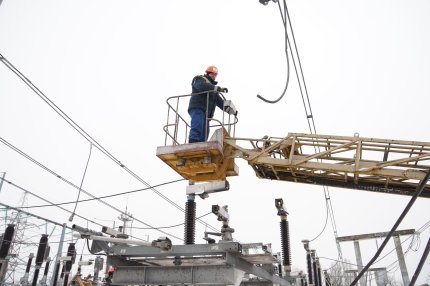According to the head of the Main Directorate of Intelligence of the Ministry of Defense, Kyryll Budanov, the Ukrainian energy system has sufficient protection against the threat of complete destruction by the criminal army of the Russian Federation.
Points of attention
- Ukrainian energy system is well-protected against complete destruction by the Russian army, with duplication and high levels of security measures in place.
- The Russian occupying forces have been maintaining combined and pinpoint strikes on Ukrainian energy infrastructure, airfields, and logistics, but there is a decrease in the number of missiles used recently.
- Kyryll Budanov highlights the successful long-range strikes by the Ukrainian military on Russian airfields, forcing the postponement of massive attacks on Ukraine.
- Despite the potential of Russia stockpiling missiles for a massive attack, the analysis suggests that complete destruction of Ukraine's energy system by the Russian army is almost unreal due to the strong protective measures in place.
- Preparations for new missile attacks on Ukraine are continuing, with concerns over the limited use of missiles by the Russian occupying forces due to a decrease in production.
Budanov on the protection of the Ukrainian energy system and the prospects for the destruction of energy facilities on the territory of the Russian Federation
All these nodes are very strongly protected. Just as we try to protect them. Also, similar measures are taking place in Russia. Only they went the way of increasing the air defense system. They have much greater capabilities for this. Because they are the manufacturers of such systems, - explains the head of GUR.

According to him, it cannot be said that Ukraine is currently capable of staging a blackout in Russia.
We will not put it completely. As they will not completely trust us either. The Soviet system was maximally branched and duplicated conditionally there three or four times, or in certain nodes the duplication is going on. You can make life difficult. To completely destroy it is almost impossible, - Budanov convinces.
At the same time, the head of the GUR noted the successful long-range strikes of the Ukrainian military on the "Olenya" airfield in the north of Russia.
According to him, this forced the Russian occupiers to postpone another massive attack on Ukraine for some time.
And this is an interesting point: for example, drones recently reached certain airfields in the Russian Federation. To the northern ones. To Olenia. There are affected long-range bombers there, and this forced them to postpone the next massive strikes on us for at least a few days, - emphasizes Budanov.
When to expect a new massive missile and drone attack by the Russian army on Ukraine
According to the military-political analyst Oleksandr Kovalenko, the criminal army of the Russian Federation can stockpile missiles for a massive missile attack on Ukraine already this month.
In July 2024, the Russian occupiers maintained the same tactics of carrying out combined and pinpoint strikes on Ukrainian civil energy infrastructure facilities, airfields and logistics. But this month, the enemy used the smallest amount of missile components, Kovalenko notes.
He noted that during July, the criminal army of the Russian Federation used against Ukraine:
X-59/69 - 28 (22 shot down);
9М723 OTRK "Iskander-M" - 24/1;
9М727 OTRK "Iskander-K" - 3/1;
X-101/555/55 - 22/19;
KRMB "Kalibr" - 14/11;
Kh-47M2 "Dagger" - 1/1;
3M22 "Zircon" - 1/0;
X-22 - 2/0;
Unknown type - 14/1.
Launches of the Kh-35, Kh-38ML and Kh-31P were also recorded.
In total, in July, the Russian occupying forces used 112 missiles of various types, which is the lowest figure since the beginning of 2024, Kovalenko concluded. - Mykolaiv, Kharkiv, Odesa and Dnipropetrovsk regions were hit the most, - the analyst emphasizes.
In his opinion, in addition to preparations for a new massive missile attack on Ukraine in August, the limited use of missiles by the Russian occupiers is connected with a decrease in the number of missiles produced.








